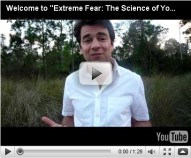One of the most powerful anxiolytics — that is, compounds which reduce fear and anxiety –is oxytocin, the hormone of mammalian bonding. Social acts like hugging, touching, and having sex all increase our levels of oxytocin; people who have recently had penetrative sexual intercourse have been found to exhibit less fear in social settings.
Of course, the ultimate oxytocin-generating experience is giving birth to and nursing an infant, and nothing is more fearless than a mother protecting her child. Having become a father a year ago, I can understand what the woman on this train platform must have been going through as she realized what was about to happen.
I wonder if oxytocin might take its effect, at least in part, by somehow affecting the way that our brains process “self” and “other” — bringing those we love and feel affection over the boundary and making them, in effect, part of ourselves. About six years ago I remember being repulsed by the sight of my sister casually picking a piece of half-chewed banana off her baby daughter’s bib and popping it into her mouth. Since my son was born, I find myself doing this sort of thing all the time. Eating my son’s half-eaten food isn’t like eating someone else’s chewed-up, spit-covered gunk, it’s like eating my own.
The only problem with my theory is that watching your baby roll under a train wouldn’t be as bad as going under a train yourself; it would be worse.
Filed under: Social Fear, fear, oxytocin

[…] It has a reputation as the warmest, fuzziest chemical around. As I’ve written about earlier, oxytocin can modulate feelings of fear in social settings. But it does much more than that. Apart […]